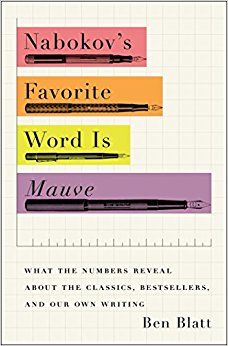 Ernest Hemingway has the literary reputation for precise, uncluttered writing. Is it justified?
Ernest Hemingway has the literary reputation for precise, uncluttered writing. Is it justified?- Elmore Leonard famously objected to the use of exclamation points (!) to juice up the energy of prose. Did he follow his own advice?
- E.B. White urged readers to curtail using the word “not” to describe actions. Describe actions, he urged, in positive terms. It enhances character portrayal. Did his own writing do that?
- Who among popular writers today uses the most cliché’s? The least?
- Is there a best—typical—way to begin a book?
- If you are a writer, is there one word of which you are so fond—or is it just a habit—that you use it excessively, so that you thereby deplete your own writing and the impact of that very word?
Ben Blatt, in his book, Nabokov’s Favorite Word is Mauve, answers these questions and many more. He does so by using up-to-date mass data collection and computer scans, to reveal how writers write. I found the book not only fascinating, but—from a writing point of view—very instructive.
He is not suggesting there is a mathematical formula for good writing, but that every writer has patterns, imbedded structures, and word usage, which may help, or hurt one’s work. The point is, a good writer needs to become conscious of these elements.
As for those who teach writing, this is a book that will help you define some key problems about the skill—and difficulty—of writing well.
Readers? You’ll be fascinated what you have, or have not noticed.
Librarians, you will look at your shelves differently.
4 thoughts on “Revealing how writers write”
I seem to have recurring themes, such as family and adoption.
I always enjoy your posts, Avi. I will definitely look up this book. One of my recurring themes, as a writer, is inclusion and I have a tendency to write with a British mindset — spelling, words — probably from being an English Literature major. 🙂 Oh, and I like smily faces.
Interesting thoughts. When I first began writing with Dr Mildred Laughlin I used the word “wonderful” over and over and never noticed until she circled and laughed at every overused descriptor. It was a “wonderful” way to point out my weakness. I still laugh when I see or hear that word.